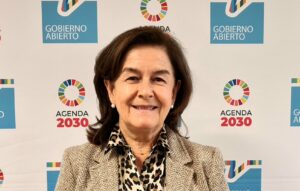Faces of Open Government: Isabel Moya Pérez
Rostros de Gobierno Abierto: Isabel Moya Pérez
Open Gov Week is celebrated every year in May to unite governments and civil society and find solutions to the most pressing issues communities face through events, public debates, webinars, and more. Isabel Moya Pérez, Deputy Director General of Open Government of Spain, shares what her country did during their OGW and how the new OGP strategy can help foster more open and accountable democracies.
Why is Open Gov Week so important for Spain?
Spain is an open country, which has made improving its democracy an objective shared by all its public institutions. Open Gov Week is an opportunity for everyone in the country, wherever they live, to learn more about how their institutions work, what they are working on and how public services are provided. The Week is also a good example of the importance we give to collaboration between governments and with civil society in a highly decentralized State like ours, in which its autonomous communities and municipalities have political and administrative autonomy.
TransparencyAccording to OGP’s Articles of Governance, transparency occurs when “government-held information (including on activities and decisions) is open, comprehensive, timely, freely available to the pub... More and accountability, public integrity, participation, and collaboration are the common values we uphold. The Week allows us to sensitize citizens about the role they play in our democracy and the importance of all people fully exercising their rights of access to public information and participation. In 2021, the Open Government Forum of Spain adopted an agreement for the inclusive communication of open government and this is also a commitmentOGP commitments are promises for reform co-created by governments and civil society and submitted as part of an action plan. Commitments typically include a description of the problem, concrete action... that Spain has assumed in the IV action planAction plans are at the core of a government’s participation in OGP. They are the product of a co-creation process in which government and civil society jointly develop commitments to open governmen..., so we are in line with this exciting OGP initiative.
What kind of events did you organize for Open Gov Week? Give two examples of the most important events that help advance the open government agenda in the country and contribute to co-creation or implementation of open gov reforms.
Thanks to the commitment of all organizers, this year’s OGW -which in Spain was celebrated in March so as not to interfere with the call for regional and local electionsImproving transparency in elections and maintaining the independence of electoral commissions is vital for promoting trust in the electoral system, preventing electoral fraud, and upholding the democr... More – has resulted in the registration of 1,025 events, which is a really high number. Of these, 431 have consisted of open houses at different institutions and 100 in seminars/webinars. But, 82 have also been held in workshops, 77 informative talks, 75 presentations of public plans and 54 debates or colloquiums, as well as participatory processes such as launching consultations or virtual content events.
Spain has therefore broken its own record (in 2022 we organized 500 activities) and we are very satisfied with these results. Each and every one of these activities constitutes a grain of sand to continue advancing in the open government agenda in our country, but I will cite some events that, in my opinion, can illustrate the degree of political commitment of all the powers of the State.
For example, the Minister of Finance and Public Function participated in the annual meeting of the Plenary of the Open Government Forum, which we held in the Autonomous Community of La Rioja, supporting the commitment of the Government of Spain with open government values and highlighting the role that our multi-stakeholder body plays in the design, implementation, and evaluation of open government policies.
Eight other ministers also participated in the Week, such as the Minister of Universities, who is a renowned expert in participation in public policies, who gave an interesting conference, through our HazLab laboratory, with the title “Public Policies: between technocracy and democracy”, or the Minister of the Interior who inaugurated the week, bringing the values of open government, to the Dueñas Penitentiary Center in the province of Palencia, on the occasion of its 25 years of operation.
Of special interest is the Conference on the reform of the Transparency Law that was developed at the Center for Political and Constitutional Studies with the participation of representatives of constitutional bodies and those of constitutional relevanceAccording to the OGP Articles of Governance, OGP commitments should include a clear open government lens. Specifically, they should advance at least one of the OGP values: transparency, citizen partic..., who made interesting contributions on said reform, for which a broad participatory process has been opened within our Open Government Forum.
The important thing is that open government, during the Week, reaches everyone, regardless of their place of residence or personal or socioeconomic circumstances.
What is your advice for other countries organizing events during Open Gov Week?
In my opinion, the key to the success of the Week in Spain lies in the coordination and cooperation between all the actors that participate in the governance system of the IV Plan for Spain: The Open Government Forum, the Sector Commission (which brings together at the three levels of Administration: this, regional and local), and the Inter-ministerial Group of Transparency and Open Government Information Units, and, of course, civil society organizations. We coordinated details with all of them well in advance including the road map for the organization of the Week. A form on the Transparency Portal was used to register events and my open government team went out of its way to ensure that everything went smoothly, reviewing registrations and answering questions.
My advice is to strengthen collaboration with all stakeholders to achieve the success of this initiative.
Congratulations to the government of Spain for being selected as part of the OGP Steering CommitteeThe Steering Committee is OGP’s executive decision-making body. Its role is to develop, promote and safeguard OGP’s values, principles and interests; establish OGP’s core ideas, policies, and ru.... Now that your term will officially begin in October 2023, what are you most excited about in this new role?
Spain joined OGP in 2011, but until this year we had not considered the possibility of being members of the OGP Steering Committee. We are especially moved by the fact that this first mandate of Spain in the leadership of the Partnership also coincides with the Spanish presidency of the Council of the European Union and that we have the opportunity, together with the rest of the members of the Committee, to contribute to the objective of making It is possible that the values of open government are considered as authentic citizen rights.
We want to contribute ideas, because we believe that our experience in the OGP has been very positive and that the time has come for us to bet on a better democracy by working together. Spain is a State, from the political and territorial point of view, highly decentralized. We would like to contribute our experience in the design and execution of the IV Open Government Plan for Spain 2020-2024, which is being developed cooperatively with the different levels of government and with civil society. In this sense, our experience can be a reference for other countries that have a federal or regional structure. We are also looking forward to hearing and learning from the other Committee members and working with them to advance open government values around the world. Being able to effect change seems exciting to us.
OGP just launched its strategy for the next five years (2023-2028) to better respond to the community’s needs and tackle the challenges democracies face today. What opportunities does the new strategy offer for the OGP community? And what are you most excited about?
What excites me most about this strategy is the opportunity it represents for us all to advance in improving democracy, responding to citizen expectations so that transparency, accountability, participation and inclusionOGP participating governments are working to create governments that truly serve all people. Commitments in this area may address persons with disabilities, women and girls, lesbian, gay, bisexual, tr... More form an essential part of public governance.
The strategy supposes, in this sense, a change of vision, which Spain shares, that it is not only necessary to increase the number of reformers, but that we must also add to this collective effort those who do not yet belong to our Community, putting people at the center of government decisions. In order to face these challenges, it is essential that we are capable of assuming concrete and ambitious commitments, while being aware that in each case we start from different realities.
The strategy is also committed to inclusion, which, as I have already said, is a cross-cutting issue of our IV National Action Plan, so that no person is left behind when exercising their democratic rights due to their genderOGP participating governments are bringing gender perspectives to popular policy areas, ensuring diversity in participatory processes, and specifically targeting gender gaps in policies to address gov... More, race, disability, socioeconomic situation or any other circumstance. Spain is very committed to strengthening this inclusive vision of open government. In my opinion, OGP must continue to actively promote equal opportunities and social inclusion
La Semana de Gobierno Abierto (OGW por sus siglas en inglés) se celebra en mayo de cada año para reunir a los gobiernos y la sociedad civil y encontrar soluciones a los problemas más apremiantes que enfrentan las comunidades a través de eventos, debates públicos, webinars y más. Isabel Moya Pérez es la Subdirectora General de Gobierno Abierto de España y comparte lo que hizo su país durante su propia OGW y cómo la nueva estrategia de OGP puede ayudar a fomentar democracias más abiertas y responsables.
¿Por qué la Semana de gobierno abierto es tan importante para España?
España es un país abierto, que ha hecho de la mejora de su democracia un objetivo compartido por todas sus instituciones públicas. La Semana del Gobierno Abierto es una oportunidad para que todas las personas en el país, vivan donde vivan, conozcan mejor cómo funcionan por dentro sus administraciones, en qué estamos trabajando y cómo se prestan los servicios públicos. La Semana es también un buen ejemplo de la importancia que damos a la colaboración entre las administraciones y con la sociedad civil en un Estado como el nuestro, fuertemente descentralizado, en el que sus Comunidades Autónomas (nacionalidades y regiones) y sus municipios disponen de autonomía política y administrativa.
La transparencia y la rendición de cuentas, la integridad pública, la participación y la colaboración son los valores comunes que defendemos. La Semana nos permite sensibilizar a la ciudadanía sobre el rol que juegan en la democracia y la importancia de que todas las personas ejerzan plenamente sus derechos de acceso a la información pública y a participación. El Foro de Gobierno Abierto de España adoptó en 2021 un Acuerdo por la comunicación inclusiva del Gobierno Abierto y éste es también un compromiso que España ha asumido en el IV plan, así que estamos en línea con esta ilusionante iniciativa de OGP.
¿Qué tipo de eventos organizaron para la Semana de gobierno abierto? ¿Nos pueden dar dos ejemplos de eventos que ayudaron a avanzar la agenda de gobierno abierto en el país y contribuyeron a la cocreación o implementación de reformas de gobierno abierto?
Gracias al compromiso de las y los promotores, la Semana de 2023, que en España se adelantó a marzo para no interferir con la convocatoria de elecciones autonómicas y locales, se ha saldado con la inscripción de 1025 eventos, que es un número realmente muy elevado. De ellos, 431 han consistido en jornadas de puertas abiertas y 100 en seminarios/webinarios. Pero, también se han celebrado 82 en talleres, 77 charlas informativas, 75 presentaciones de planes públicos y 54 debates o coloquios, así como procesos participativos como lanzamientos de consultas o eventos de contenido virtual.
España ha batido, por tanto, su propio récord (el 2022 organizamos 500 actividades) y estamos muy satisfechos con estos resultados. Todas y cada una de estas actividades constituyen un granito de arena para continuar avanzando en la agenda del gobierno abierto en nuestro país, pero citaré algunos eventos que, a mi juicio, pueden ilustrar el grado de compromiso político de todos los poderes del estado con los objetivos de la Semana.
Por ejemplo, la Ministra de Hacienda y Función Pública participó en la reunión anual del Pleno del Foro de Gobierno Abierto, que celebramos en la Comunidad Autónoma de La Rioja, apoyando el compromiso del Gobierno de España con los valores del gobierno Abierto y destacando el papel que juega nuestro órgano multiactor en el diseño, la implementación y la evaluación de las políticas de gobierno abierto.
También participaron en la Semana otros ocho ministros y ministras, como el de Universidades, que es un reputado experto en participación en políticas públicas, que impartió una interesante conferencia, a través de nuestro laboratorio HazLab, con el título “Las Políticas Públicas: entre la tecnocracia y la democracia”, o el ministro del Interior que inauguró la semana, llevando los valores del gobierno abierto, al Centro Penitenciario de Dueñas en la provincia de Palencia, con ocasión de sus 25 años de funcionamiento.
De especial interés ha sido también la Jornada sobre la reforma de la Ley de transparencia que se desarrolló en el Centro de Estudios Políticos y Constitucionales con la participación de los representantes de los órganos constitucionales y de relevancia constitucional, que hicieron interesantes aportaciones sobre dicha reforma, para la que se ha abierto un amplio proceso participativo en el seno de nuestro Foro de Gobierno abierto.
Lo importante es que el Gobierno Abierto, durante la Semana, llegue a todas las personas, cualquiera que sea su lugar de residencia o circunstancias personales o socioeconómicas.
¿Cuál es tu consejo para otros países y localidades organizando eventos para la Semana de gobierno abierto?
En mi opinión, la clave para el éxito de la Semana en España está en la coordinación y la cooperación entre todos los actores que participan en el sistema de gobernanza del IV Plan de España: El Foro de Gobierno Abierto, la Comisión Sectorial (que reúne a los tres niveles de Administración: esta, autonómica y local), y el Grupo interministerial de Unidades de Información de Transparencia y Gobierno Abierto, y, por supuesto las organizaciones de la sociedad civil. Con todos ellos hemos consensuado con antelación suficiente a su celebración, la hoja de ruta para la organización de la Semana. La inscripción de eventos se realiza a través de un formulario en el Portal de Transparencia y mi equipo de gobierno abierto se vuelca para que todo salga bien, revisando inscripciones y resolviendo dudas. Mi consejo es fortalecer la colaboración con todos los actores para lograr el éxito de esta iniciativa.
Felicidades al gobierno de España por haber sido seleccionado como parte del Comité directivo de OGP. Ahora que su término comenzará oficialmente en octubre de 2023, ¿qué es lo que más les emociona de tener este nuevo rol?
España se incorporó en 2011 a la Alianza, pero hasta este año no nos habíamos planteado la posibilidad de ser miembros del Comité Directivo de OGP. Nos emociona, especialmente, que este primer mandato de España en la dirección de la Alianza coincida también con la presidencia española del Consejo de la Unión Europea y de que tengamos la oportunidad, junto al resto de miembros del Comité, de contribuir al objetivo de hacer posible que los valores del gobierno abierto sean considerados como auténticos derechos ciudadanos.
Queremos aportar ideas, porque consideramos que nuestra experiencia en la OGP ha sido muy positiva y que ha llegado el momento de que apostemos por una mejor democracia trabajando juntos. España es un Estado, desde el punto de vista político y territorial, fuertemente descentralizado. Nos gustaría aportar nuestra experiencia en el diseño y ejecución del IV Plan de Gobierno Abierto de España 2020-2024, que se está desarrollando de manera cooperativa con los distintos niveles de gobierno y con la sociedad civil. En este sentido nuestra experiencia puede ser un referente para otros países que tiene estructura federal o regional. Tenemos también muchas ganas de escuchar y de aprender del resto de los miembros del Comité y trabajar con ellos para impulsar los valores del gobierno abierto en todo el mundo. Poder sumar voluntades de cambio nos parece apasionante.
OGP acaba de lanzar su estrategia para los próximos cinco años (2023-2028) para responder mejor a las necesidades de la comunidad y abordar los desafíos que enfrentan las democracias hoy. ¿Qué oportunidades ofrece la nueva estrategia para la comunidad de OGP? ¿Y qué es lo que más te emociona de la estrategia?
Lo que más me emociona de esta estrategia es la oportunidad que supone para que, entre todos, avancemos en la mejora de la democracia, dando respuesta a las expectativas ciudadanas de modo que la transparencia, la rendición de cuentas, la participación y la inclusión formen parte consustancial de la gobernanza pública.
La estrategia supone, en este sentido, un cambio de visión, que España comparte, de que no sólo es necesario ampliar el número de reformadores, sino de que debemos sumar también a este esfuerzo colectivo a los que aún no pertenecen a nuestra Comunidad, poniendo a las personas en el centro de las decisiones gubernamentales. Para afrontar estos retos es imprescindible que seamos capaces de asumir compromisos concretos y ambiciosos, pero siendo conscientes de que partimos en cada caso de diferentes realidades.
La estrategia apuesta además por la inclusión, que, como ya he dicho, a es un eje transversal de nuestro IV Plan de acción nacional, para que ninguna persona se quede atrás en el ejercicio de sus derechos democráticos por razón de su género, raza, discapacidad, situación socioeconómica o cualquier otra circunstancia. España está muy comprometida en el fortalecimiento de esta visión inclusiva del gobierno abierto. En mi opinión, la OGP debe continuar promoviendo activamente la igualdad de oportunidades y la inclusión social.
Comments (1)
Leave a Reply
Related Content

OGP Strategy
Explore OGP’s 2023-2028 Strategy, how it was developed and how the open government community can help implement it.

The Future of Open Government: Supporting Democratic Resilience and Reform



Gladys Estela Riveros Rojas Reply
“La estrategia también apuesta por la inclusión, como expectativa ciudadana”, el de ser escuchado y ver el resultado como retorno de su petición, además se recupera la confianza entre ambas partes, existe una comunicación integra entre la ciudadanía y el estado.